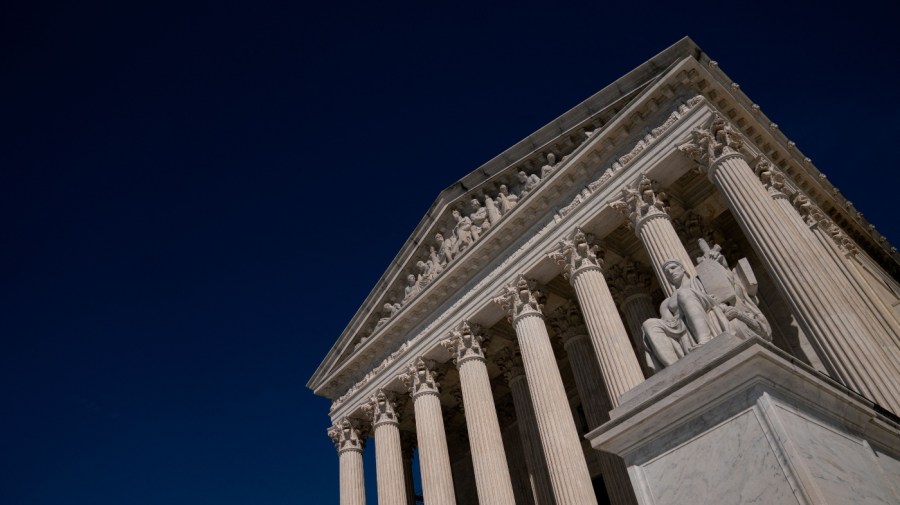Debt ceiling: Biden faces legal risks, financial peril with 14th Amendment
The unprecedented step of President Biden invoking the 14th Amendment to avoid a national default would likely lead to legal uncertainty hanging over the already-fragile financial system.
Markets are concerned about a default, which could come as soon as June 1 if Biden and lawmakers can’t come to an agreement. But if Biden chose to act unilaterally instead, the financial system could take a hit with the risk of a default being tied up in the courts.
What to know: How the 14th Amendment could solve the debt crisis
The president on Tuesday said there have been discussions about whether or not the 14th Amendment can be invoked to avert a default, adding, “I don’t think that solves our problem now. I think that only solves your problem if, once the court has ruled that it does apply for future endeavors.”
If he acted unilaterally, Biden could be sued by Treasury bondholders awaiting debt payments from the U.S. Republican lawmakers could also sue Biden, arguing that he violated Congress’s control over federal spending and taxation by ignoring the debt limit.
Legal questions loom over strategy

The legal argument hinges on language in a clause stating that U.S. sovereign debt “shall not be questioned.”
Lawmakers adopted the amendment after the Civil War, and the section in question relates to quelling future insurrections. Even so, some legal scholars believe it also gives the president power to order the Treasury to keep borrowing money and ignore the debt limit.
Treading carefully: 14th Amendment talk on debt limit viewed with extreme caution by Team Biden
David Super, a constitutional law expert at Georgetown University, said that if the president thinks the debt limit is unconstitutional, he can invoke the 14th Amendment.
He warned, though, of serious repercussions from the unprecedented step.
“Given how polarized the country is and how determined the Republicans are to use the debt limit for extortion, they surely would arrange for somebody to sue,” Super said.
“If there was someone who was found to have standing to sue, then the courts could determine whether the president’s determination is correct and could conceivably order him to cease making payments,” he added. “But that would be a very momentous choice and likely wouldn’t happen quickly.”
Jonathan Turley, a legal scholar at George Washington University, warned that “any litigation would come with potentially high political and legal costs.”
“The House has the constitutional control of the purse and is using that authority to seek budget cuts in future expenditures, including some not previously approved by Congress,” Turley said.
Q+A: 10 questions answered on the debt limit
Senior White House officials reportedly view the idea of Biden acting unilaterally as an emergency measure of last resort. Treasury Secretary Janet Yellen warned invoking the 14th Amendment to avoid a default could trigger a “constitutional crisis.”
The situation puts the Biden administration in a legal bind. The debt limit appears to clash with both the 14th Amendment and laws mandating that the federal government make certain expenditures such as Social Security payments.
While other ideas — such as minting a trillion-dollar coin — have been floated, Biden has publicly dismissed them.
Financial fallout

The Biden administration is exploring all possible avenues to avoid a catastrophic default, which would undermine global faith in U.S. debt, drive up borrowing costs for Americans and prompt millions of job losses, according to an analysis from Moody’s Analytics.
The U.S. Treasury market is the backbone of the financial system, as all assets are compared to historically risk-free Treasury bonds.
Trouble ahead: Dimon warns markets will panic as possible default nears
But experts said that the 14th Amendment route — in which the Treasury Department continues to issue debt beyond the statutory limit — poses its own risks to financial stability.
During an extended period of legal uncertainty, buyers might view newly-issued Treasury bonds as riskier or illegitimate, potentially sending interest rates soaring. The political instability could have a similar effect of driving investors away from the U.S. market in the long run, experts said.
If a court issued an injunction preventing the federal government from issuing new debt or invalidating bonds issued after the limit was breached, the nation could fall into default anyway.
“One of the great virtues of U.S. government debt is that there’s no credit risk. If that debt is invalidated, suddenly you’ve introduced it,” said Brian Knight, senior research fellow at the Mercatus Center at George Mason University.
On the other hand, some experts believe that if the Treasury Department were allowed to issue debts beyond the limit, it would find plenty of buyers interested in securing higher interest rates until the crisis is resolved.
“The debt that would be issued to bridge this period would end up being very, very short term debt,” said Daniel Alpert, managing partner of Westwood Capital. “First, you’ll see a spike in rates, but when people actually start getting paid, that will calm down.”
The financial system is still reeling from three of the four largest bank collapses in U.S. history. Banks are sitting on massive unrealized losses on Treasury bonds that saw their value tank when the Federal Reserve aggressively hiked interest rates.
Opponents of the debt limit see the 14th Amendment as a long-term solution to credit risk that arises every time the GOP threatens to block an increase. Prominent bankers including JPMorgan Chase CEO Jamie Dimon have called on Congress to abolish the debt ceiling.
But the constitutionality of the debt limit hasn’t been challenged in court, until recently.
On Monday, the National Association of Government Employees sued to end the debt limit, stating that the statute gives the president “unchecked discretion to cancel or curtail the operations of government approved by Congress without the approval of Congress.”
The union, which represents 75,000 federal government workers, cited the 14th Amendment in its complaint.
“This litigation is both an effort to protect our members from illegal furloughs and to correct an unconstitutional statute that frequently creates uncertainty and anxiety for millions of Americans,” David Holway, the union’s president, said in a statement.
The lawsuit is aimed at Biden and Yellen. If a court ruled in the union’s favor, the Biden administration could simply choose not to appeal, legal experts said.
Copyright 2023 Nexstar Media Inc. All rights reserved. This material may not be published, broadcast, rewritten, or redistributed. Regular the hill posts







